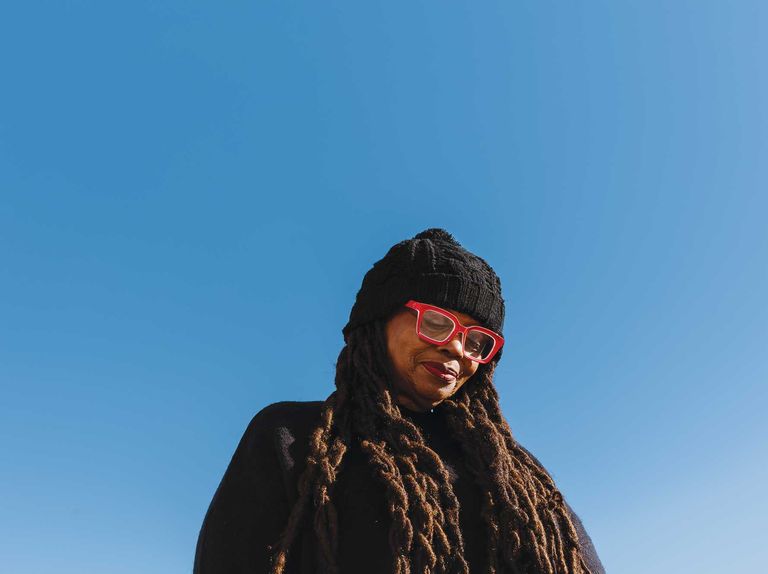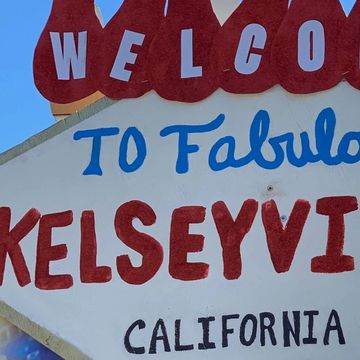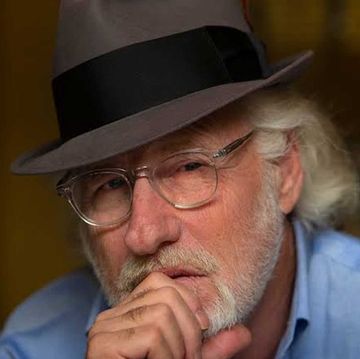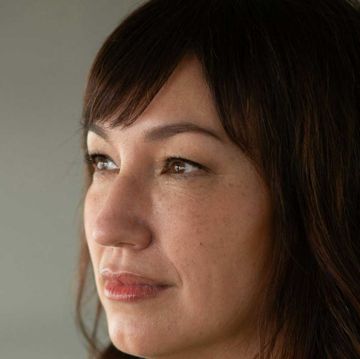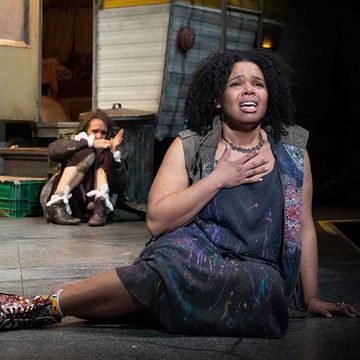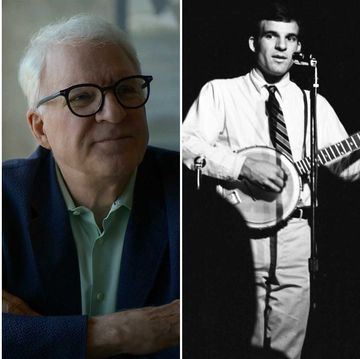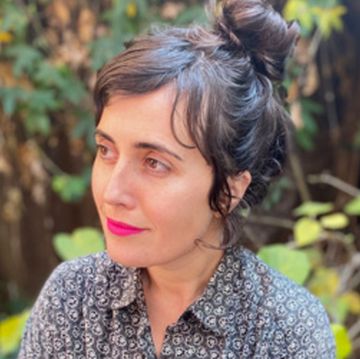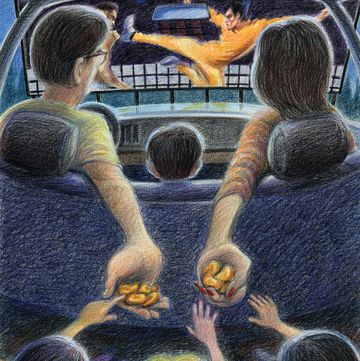To understand us, you must know that the North American African is a postapocalyptic being: we are, each of us, born in a certain year, be it 1619 or 1916, or this new year, and in a certain place, but the origin story of our dispossession precedes us all, and it is because of this other birth that we must reconstruct ourselves in the time we have here in the stories that we tell about who we are and wish to be.
Ayodele Nzinga, the 70-year-old spoken-word poet we call WordSlanger, the activist, playwright, PhD, preserver of stories, She Who Remembers; she, the first and current poet laureate of Oakland, California, has a story that begins in mystery: she has two birth certificates, Nzinga reveals, one from State Line, Mississippi, the other from Chicago, Illinois, and neither she nor anybody else that is alive is entirely sure which is right. Maybe they both are, for just as the rural South and urban North are only interchangeable coordinates in the flight of Black folk out of one frying pan and into another fire, Nzinga’s beginnings and who she’s become form their own continuum.
Yes, she does remember the standard childhood fare: Christmas pageants where she first discovered theater, classrooms where she happened upon Edgar Allan Poe and learned to love literature—but She Who Remembers will tell you that she and her people situated beyond the Eurocentric pale cannot be so neatly spoken of. She was an African griot long before she was Oakland’s anointed wordsmith.
“I do a lot of shit,” Nzinga declares, “and it’s always the same shit.” Put another way: the griot is the playwright; the WordSlanger is the laureate.
This article appears in the Spring 2022 issue of Alta Journal.
SUBSCRIBE
But she wasn’t always this irreducibly integrated. Stories are how we understand ourselves. Too often, neat, easy stories that move in straight, fast lines are how we construct ourselves and how other people both build us up and tear us down. In sixth grade in Vallejo, California, Nzinga was the only Black child. Blackness had been constructed in the minds of her peers and her teacher overseers to consist solely of a few basic traits: within the white people’s pale, Black people were athletes and little else. Called on to run the 50-yard dash that year, Nzinga found that she was slow. This was of little moment to the child but a terrible revelation to the school at large. Something was amiss; Blacks were all Jesse Owens if they had two legs. The child was retested with the hope that she would become a stereotype. But she got no faster. Then, inside classrooms, the child discovered she wasn’t “smart” anymore. Then she stopped dancing—“because when we had school dances, everyone would stop dancing and look at me.”
Reduced to the stories that the white world told her about herself, she began to lose herself.
When she moved back to the Black part of Vallejo, the same teacher who had enlivened her with Poe now sat her down and asked what had broken her spirit. By the light of memory, Nzinga summons his response to her silence: “I don’t want to ever hear you quiet again.”
For those versed in Afrocentrist rhetoric, there is a familiar throughline here, one that jumps from white to Black, from oppression to freedom, from Europe to African America. But Nzinga’s experience allows for no such simple stories. “How ridiculous is it to spend your life defending a state of being that doesn’t actually exist?” she asks me sharply, each word throwing me against a wall. “There are only human beings,” she insists.
And yet the North American African is compelled by the force of the apocalypse that has produced her to defend nonexistent Blackness so that nonexistent whiteness does not subsume it in this very real world. While still a child, Nzinga began to realize that something valuable had been extracted from her by the Eurocentrism of the education system of mid-20th-century America, not to mention a TV world that had all day for Judy Garland and no time for the Nzingas of America. She began to ask difficult questions: Why was no literature by Black people taught in a vastly Black school? Why was Black intellectual product implicitly deemed inconsequential?
She received no answers. Her work is now one answer. Nzinga is still taking in all that being named—last June—the poet laureate of Oakland entails: “The deliciousness of being chosen to speak, handed a mic, considering who I am, the people’s poet…[it’s] the best piece of jewelry ever. I hope to wear it well.”
Read her recent book of poetry and incantation and chant and sorrow song: in SorrowLand Oracle, She Who Remembers calls from out the continuum of Black diaspora experience, in one lyric inhabiting a centuries-old West African shore, in the next a Black woman shackled somewhere in the Americas, and then WordSlanger rises up in lament in West Oakland in a year very near to this one.
The work is many things, all of them inextricably, paradoxically Black.
“I work from a super-Black lens,” Nzinga affirms. “You can walk in the room talkin’ about you’re there for the planet’s rights, animals’ rights…least popular thing you can say is you’re there for Black rights.”
“I read how they treated the North American African experience in history books,” she recalls of her educational upbringing, “so I showed up in class ready to battle. I was totally uncontrollable, so by the end, in high school, I spent my time at the dean’s office because neither my English nor my history teacher could tolerate me.”
She and the school system found themselves at irreconcilable odds. Not surprisingly, nobody said a word to her about university. That might have been OK, because Nzinga’s dream wasn’t one she would need college for—she wanted to be an actress, to tell stories. But her mother flatly discouraged this, citing the very racism and colorism that Nzinga sought to overcome: there were few Black actresses, her mother observed, and even fewer not the pallor of Dorothy Dandridge.
So she “traveled” at random and without plan or prospects for a degree throughout the East Bay’s Peralta Community College schools. It was along that journey that she met another African cast ashore and out of doors. “I had read work by Marvin X,” Nzinga recalls, “so it was sort of like meeting an icon. Marvin was a young professor who had gotten fired from Fresno State.”
Specifically, Marvin X had been forced out of one of the first ethnic studies professorships in America in 1969 owing to faculty and community members’ objections to having a Black Muslim on staff, which in turn spurred the most volatile college-campus protest of the era. The Campus Unrest Collection, tucked away in Fresno State’s Henry Madden Library, tells the story.
Having lost that historic struggle, X was out of Fresno, doing his own thing in the Bay Area. “He decided that he was going to do a play,” Nzinga remembers, “and, [having] heard about me, decided I would be the director. But I still didn’t know that was what I was supposed to do with my life.”
About two decades later, after the street life had got ahold of her, including an addiction to hard drugs, and after she, of her own uninstitutionalized will, had managed to spring herself free and sober from all that, Nzinga heard through the grapevine that Marvin X was looking for her. He, too, had fallen on bad times and was picking himself back up. He had written a play about it all, One Day in the Life, chronicling his descent into crack cocaine addiction in San Francisco’s Tenderloin district and the long path back to sobriety. “He wanted me to direct it,” Nzinga remembers, “and I said yes…. It gave me my safe house, my program, my 12 steps.” The play ran from 1996 through 2002, becoming, she notes, “the longest-running piece of North American African theater in Northern California, six and a half years.”
Driven by a deep love for her community, Nzinga discovered an organic audience of “people who need to be reassured, facilitated into knowing that they’re the only author that really matters in their life.”
In the wake of this and other theatrical successes, she eventually became acquainted with the nonprofit world. There was money to be made and shows to perform in that space, but Nzinga saw it for what it was and wasn’t having any of it: “Nonprofits are not necessarily about doing good work. They are about people who are employed because other people are impoverished.”
Instead, she met Washington Burns, a retired physician who had become the executive director of the Prescott-Joseph Center for Community Enhancement in West Oakland. Burns introduced her to what she calls “Thea’s myth.” Sister Thea Bowman was a Black Catholic evangelist and teacher. Nzinga found synergy with Sister Thea on many levels, once upon a time having been raised in the Catholic church herself. But it was Thea’s community activism and her love of theater and African spiritual that really drew the griot.
Embracing Sister Thea’s ethos and the Black Panthers’ do-it-ourselves ethic, She Who Remembers wove her own syncretic spiritual world, one as alive as the people who populate her plays and poetry: animist, Africanist, and also artist, for art, like spirit, comes as a calling far greater than oneself. The griot came fully into being.
Meanwhile, Burns did her a solid. “I’ve had so many blessings,” she says. “Meeting Dr. Burns was a blessing. He knew that Marvin X was my mentor…. He gave me a little office [at the Prescott-Joseph Center], and I became an artist in residence, no salary, no budget.” The griot’s crisp storytelling begins to waver, and I sense something immensely poignant come upon the conversation. “I showed up one day, and Dr. Burns told me to go out in the backyard; there was something he wanted to show me. They were building a stage. It still makes me want to cry when I think about it. He kept his word, man, he kept his word.”
Shakespeare. In 1999 at 920 Peralta in the heart of West Oakland. That, ironically, was how it began. The bard “was like a lingua franca,” Nzinga explains, “a known and accepted part of the pale that gave us the keys to the theater through the Catholic Church.” But she faced some understandable resistance. “I’m trying to get a few Black people to do Shakespeare,” she recalls. “I got folks looking at me funny.” She would have to strike a bargain, she realized. “You do the classic version,” she bartered, “and we’ll collaborate on a hip-hop version.”
The hip-hop version she wrote, Ebony and Johnny: A Star Crossed Hood Tale, set in West Oakland, became the first of many such exchanges. Her actor collective, the Lower Bottom Playaz, would go on to perform other plays, like Macbeth (or Mack, a Gangsta’s Tale), both in their original and in reimagined form.
Until its closure in 2013, the Sister Thea Bowman Memorial Theater served as a base of community. For Nzinga, that community began where all community begins. “I brought my children into my life’s work,” she reflects, explaining the importance of intergenerational bonds in the Black family. “I dragged them into the family business, beginning with my son when he was 9 years old. He’s 30 now…. I used it to give them an example of how one does something and that one does not have to work for someone else.”
Much more than Shakespeare was ultimately at play in the playhouse. “In retrospect, both Thea and I used Shakespeare to bring Africa into the room,” Nzinga says, crediting the power of Thea’s myth for the theater’s success.
Fully in her power as an impresario of stagecraft, Nzinga declares that while she can “teach you how to talk loud and which way to turn, that doesn’t make you an actor.” She adds, “I drive classically trained actors crazy. Rather than classically trained actors, I’m interested in superintelligent human beings who aren’t afraid to be naked onstage and to wear somebody else’s story as their truth…even put yourself in your oppressor’s shoes, understand what motivates them, understand what frightens them…. I don’t think it makes us any more adaptable to the behavior, but being able to understand the behavior perhaps informs counternarratives that can deconstruct those things.”
Eventually, a counter-canonical narrativist, August Wilson, came calling for her in the way all African griots do, across time, from out the grave: “Dr. Burns sent me to A.C.T. [American Conservatory Theater] to see Gem of the Ocean. I was impressed with the grandness of the production, but the master’s work was muted…. Then I saw Joe Turner’s Come and Gone at the Berkeley Repertory Theatre. I was transported by the tale.”
“It’s the only Wilson play that I’ve ever seen produced by someone other than myself that wasn’t overwrought with buffoonery. Wilson,” she makes clear, “does not do comedy. Wilson is very embracing of the tragedies in life; however, he gives you an even playing field…. The other productions relied too heavily on the element of comedy…because people are afraid of the strength that’s in the work.”
The Lower Bottom Playaz is the only theater group to have staged Wilson’s entire, 10-play Century Cycle in chronological order, a feat that, along with the group’s many other productions, gives Oakland soil locative claim to being the site of the Black canon. For its 23rd season, titled “Women’s Work,” the collective hopes to bring a number of performances to its current home, PianoFight in Oakland (in the space formerly known as the Flight Deck), and was planning, at press time, to begin with Nzinga’s one-woman show, in March, either in person or virtually.
This story of a great Oakland artist doesn’t end here, for Oakland is not an art piece. After premiering Kevin Epps’s documentary Straight Outta Hunters Point in Oakland in 2003 and starting to understand gentrification as not a local but a global issue, She Who Remembers began to chart its encroachment upon her community. “In 2009,” she reflects, “things got weird.” A global financial crisis combined with a city plan aiming to completely alter the demography of Oakland will do that.
She Who Remembers penned “Gentrification: No Resting Place,” a three-part speculative nonfiction that predicts the shifts that have since occurred. In it, she implores Black folk to read the voluminous West Oakland Specific Plan, to no avail. At several hundred pages in length, the plan is a bureaucratic document designed to go unread.
Marvin X, Oakland Post owner Paul Cobb, and others had lobbied for some time for a Black Arts Movement district in Oakland. Eventually, Nzinga sat with X and Amiri Baraka to discuss the idea, but when younger Black activists registered their apprehension that it would be some sort of patronizing Negro Museum District, which would likely increase rents, remove Negroes, and repeat the cycle of displacement that stole her people to these shores to begin with, Nzinga took a cue from the young folks.
“By entering into the [political] fray, I changed that dynamic,” she reflects. Rather than a tourist thoroughfare, Nzinga pursued a business district that would center not the carefully curated history but the real and current needs of the very people, Black people, whom the city was trying to push out of city limits.
“I hit the streets in a different way,” she says. “I organized BAMBD CDC”—the Black Arts Movement Business District Community Development Corporation of Oakland, an organization premised on the creation of spaces dedicated to the growth, culture, and sustaining of Black livity.
These principles matter to Nzinga. Words, she will tell you, are agreements. They are also poetry and the source of story, the genesis of consciousness. “Light cut dark upon command,” she tells me, “and here we are.”•
Keenan Norris’s latest book, Chi Boy: Native Sons and Chicago Reckonings, was published in 2023. He is the author of the novel The Confession of Copeland Cane, which received the 2022 Northern California Book Award, as well as the novels Lustre and Brother and the Dancer. Native to the Inland Empire, he now lives in San Leandro, California.
